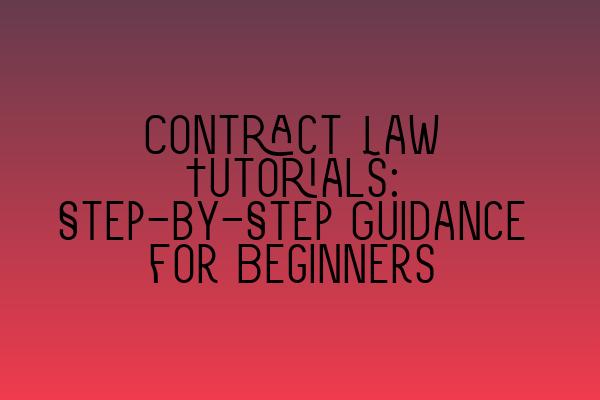Are you a beginner in contract law and looking for step-by-step guidance? Look no further! In this blog post, we will provide you with a comprehensive tutorial on contract law, breaking down complex concepts and providing practical examples to help you understand the essentials.
Understanding the Basics of Contract Law
Contract law is a fundamental aspect of legal studies and practice. It governs the creation, interpretation, and enforcement of agreements between two or more parties. Understanding the basics of contract law is essential for anyone interested in a career in law or for individuals dealing with legal contracts in their personal or professional lives.
Contract law can be a complex and intricate subject, but with the right guidance, it can become more approachable. Let’s dive into the step-by-step process of understanding contract law.
Step 1: Understanding the Elements of a Valid Contract
Before delving into the intricacies of contract law, it’s important to understand the essential elements that make a contract valid. These elements include:
- Offer: An offer is a clear indication of willingness to enter into a contract under certain terms.
- Acceptance: Acceptance is the unequivocal agreement to the terms of the offer.
- Consideration: Consideration refers to something of value exchanged between the parties involved.
- Intention to create legal relations: Both parties must have the intention to be legally bound by the contract.
- Capacity: The parties involved must have the legal capacity to enter into a contract.
- Legality: The contract must be formed for a legal purpose.
By understanding these elements, you can begin to identify and evaluate the validity of a contract.
Step 2: Identifying Types of Contracts
Contracts can come in various forms, each with its own set of rules and considerations. Some common types of contracts include:
- Express Contracts: These contracts are explicitly stated and agreed upon verbally or in writing.
- Implied Contracts: Implied contracts are formed through the actions and conduct of the parties involved.
- Unilateral Contracts: Unilateral contracts involve a promise made by one party in exchange for an act by the other party.
- Bilateral Contracts: Bilateral contracts involve mutual promises made between both parties.
Understanding the different types of contracts will help you analyze and interpret the terms and obligations within each.
Step 3: Interpreting and Enforcing Contracts
Once you have identified the elements and type of contract, it is crucial to understand how contracts are interpreted and enforced within the legal system. This involves:
- Contractual Interpretation: Examining the language, terms, and intentions of the parties to ascertain the meaning and scope of the contract.
- Remedies for Breach: Understanding the consequences and available remedies if one party fails to fulfill their obligations under the contract.
- Contractual Disputes: Familiarizing yourself with the processes and procedures involved in resolving disputes arising from contract breaches or disagreements.
By learning how contracts are interpreted and enforced, you can effectively navigate and protect your rights in contractual obligations.
Step 4: Practical Guidance and Case Studies
Understanding the theory of contract law is one thing, but applying it to real-life scenarios is another. To solidify your knowledge and enhance your understanding, it’s crucial to review practical guidance and case studies.
At SQE Contract Law, we provide comprehensive tutorials, practice exams, and preparation courses designed to help beginners grasp the intricacies of contract law. Our resources include:
- SQE 1 Practice Exam Questions: Test your knowledge with our practice quizzes focused on contract law.
- SQE 1 Practice Mocks FLK1 FLK2: Practice your contract law skills with our mock exams.
- SQE 2 Preparation Courses: Prepare for advanced contract law topics with our comprehensive courses.
- SQE 1 Preparation Courses: Lay the foundation of your contract law knowledge with our in-depth courses.
- SRA SQE Exam Dates: Stay updated on the upcoming SQE exam dates to plan your preparation effectively.
By utilizing these resources, you can enhance your understanding of contract law and develop the skills necessary to excel.
Conclusion
Understanding contract law is essential for anyone dealing with legal agreements. By following these step-by-step tutorials, you can grasp the basics, identify types of contracts, interpret and enforce them, and gain practical guidance through case studies and practice exams.
At SQE Contract Law, we are committed to providing the best resources and courses to help beginners navigate the world of contract law. Start your contract law journey with us today!
